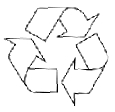
[ Concordia | CTR Home | Welcome | This Issue | Stories | The Editor's Desk ]


by David Gambrill
"People will recycle if there is a blue box nearby," said David Smaller. "If there isn't, then they're not going to do it.
Smaller conducted a survey of students last March, when he was Recycling Committee Coordinator, as part of his Honours degree in Sociology. "That general attitude appears throughout all environmental issues, in the sense that the vast majority are willing to do anything -- just as long as it's easy."
The survey, co-sponsored by QPIRG Concordia and Concordia's natural-food store, Le Frigo Vert, measured the attitudes and behaviour of 800 people at Concordia, including 715 students and 81 employees.
Sixty-one percent of respondents said they would be willing to spend at least one hour of their time each week to reduce environmental problems, and 70 per cent would be willing to do without many non-essential consumer products.
But this awareness and concern do not automatically translate into recycling, composting food waste, buying organic food items, or printing or copying on both sides of a page. "People who are aware of recycling are a little bit more pro-environmental in their behaviour, but really not a lot," Smaller said.
Respondents were given a list of 12 environmentally-friendly tasks and were asked to indicate which they had done. The top five answers, in order, were recycling, talking with friends, refusing to buy an item, being a "good citizen," and shopping at an environmentally friendly store.
Smaller said these results show that governments, corporations and academic institutions will have to take the lead. "The environment is a product of much larger political and economic issues," he said. "It's clear that the people who are doing the best in the world today are the people who are polluting the most."
John Purkis, this year's recycling coordinator, said Smaller's report has already been useful in identifying why people are not recycling as much as they could be, particularly in the larger buildings. "For example, there are not enough bins, poor signage, bad location of bins, overflowing bins, and so on."
In August, the City of Montreal distributed green recycling bins in the downtown core for businesses and residents, and Purkis encourages Concordians in the annex buildings along Mackay and Bishop Sts. to use them for bottles and cans.
John Purkis can supply a list of what can and cannot go into the city's green recycling bins. Please contact him at recycle@concordia.ca, or call 848-7351. There is also a Web site at http://alcor.concordia.ca/~recycle, and a list-serve address: ecology@concordia.ca
[ Concordia | CTR Home | Welcome | This Issue | Stories | The Editor's Desk ]